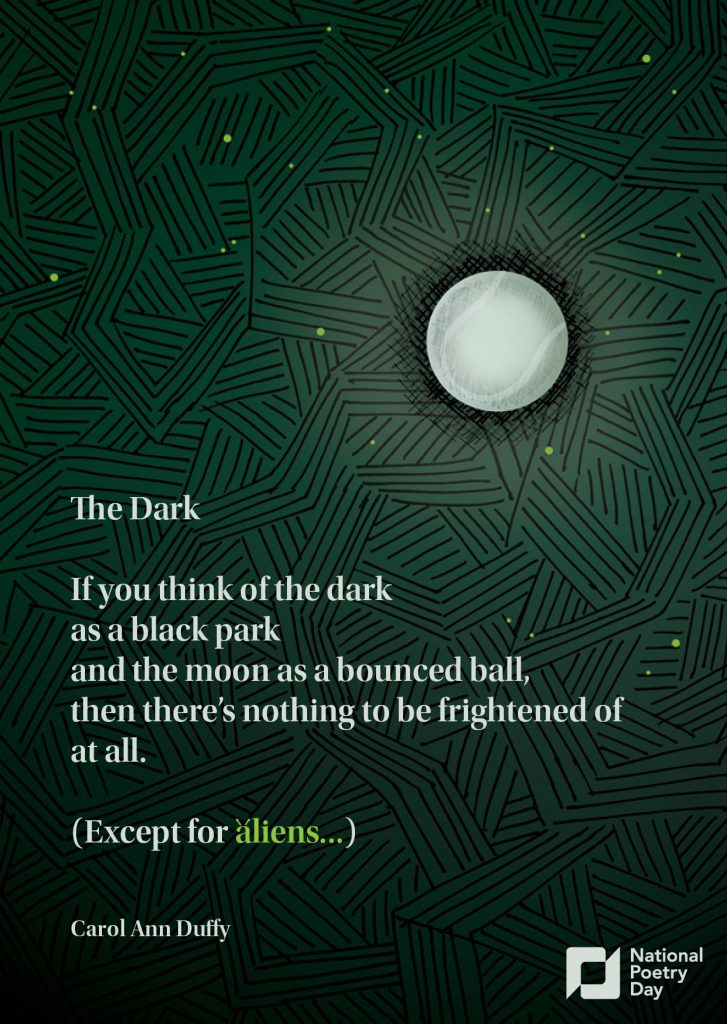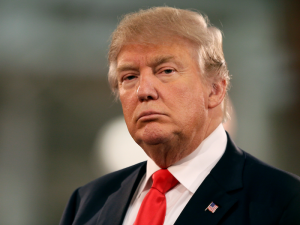Ratnadevi

I see this poem by Carol Ann Duffy, the current UK poet laureate on our bathroom wall every day; it helps me to keep my cool when faced with the many concerns of 21st century living that easily spark fear. For example: the recent election of Donald Trump as the American president. In a delightfully whimsical tone, the poet counsels us in how to deal with fear: you simply change the way you look at things. There is no absolute reality out there called “the dark”—why not see it as a “park?” Similar sound, and still pitch black, but it is transformed into more familiar, manageable territory, particularly in the light provided by the moon. We’ve bounced it up there ourselves in fact; we’ve made use of our ingenious magical powers, fortified by rhyme (ball, at all).
And then there is a pause, where we hold our breath: has it worked?
In the poem our feeling of reassurance is followed by the caveat, (except for aliens…), which makes us smile. We find one of our most enduring human traits exposed: for our minds to scan for the sources of possible danger, more likely than not, finding it (even in most outlandish forms), fixing the thoughts through repetition and to believe those thoughts, to identify with them. The fact that we have had some success in using our minds more creatively doesn’t mean we have cracked the habit.
Followers of the Buddhist Path are familiar with this way of thinking: to the extent we have insight into the construction of our own reality, to that extent we enjoy freedom from pain and fear. This can liberate more resources for wise and compassionate action. One way of accessing this wiser perspective is to recognize how we keep our “self” in a state of painful tension by holding vehemently to our views and opinions. The more fear, the stronger the views, it seems. One certainly gets that impression from the current post-election discourse in the media.
“And how is this insight going to save the world from Trump?” I hear the indignant voices. “He is going to destroy the eco–sphere in blind, self-interested denial of climate change; encourage racial and religious divisiveness and violence; make the rich richer and the poor poorer. He is far too unpredictable in temperament to be in charge of nuclear weapons!” Can you feel the fear and anger rising? The helplessness? The tightness that comes with this attitude?
The modern global situation is so complex and ambiguous, that it is very difficult for anyone to see what’s going on and what the right course of action might be. No wonder we are confused and frightened. Politicians seem as helpless as we are to deal with the war in Syria, the refugee crisis, random bomb attacks and so on. According to the documentary filmmaker Adam Curtis, we isolate ourselves in “hypernormalisation,” we “retreat into a simplified, and often completely fake version of the world. But because it is all around us we accept it as normal.” Demonising Trump is part of that. Have a look at his film, and also the 3-part episode “imaginationland” from South Park, which is a humorous take on the imagination, questioning what is real.
 What also helps me maintain a sense of agency is talking openly with friends, and using my best awareness skills to avoid reinforcement of views and stereotyping. What emerged out of a discussion with a friend was that Trump reminds me of my father, who died about 15 years ago. He would have said: “Global warming? Don’t see any evidence of it: its bloomin freezing! This is a conspiracy led by the Chinese Government. I’m not taking any bullshit from anyone. Nobody is stopping me from flying as much as I like.”
What also helps me maintain a sense of agency is talking openly with friends, and using my best awareness skills to avoid reinforcement of views and stereotyping. What emerged out of a discussion with a friend was that Trump reminds me of my father, who died about 15 years ago. He would have said: “Global warming? Don’t see any evidence of it: its bloomin freezing! This is a conspiracy led by the Chinese Government. I’m not taking any bullshit from anyone. Nobody is stopping me from flying as much as I like.”
Does Trump remind you of someone you know? It would be easy to judge “He was a bully!” (and I certainly have done so in the past) and yet, my father’s family stood up against Hitler in the Third Reich in Germany. Being a relatively uneducated man, he prided himself in his “civil courage” in dealing with the educated establishment. As a teenager I exhausted myself in endless, angry arguments where neither of us listened to the other person. I like to think that if we talked now I would go about it in a different way. I would silently acknowledge my own exasperation and need for respect and being listened to, and then do my best to really listen to him.
I would ask him questions; not to trick him, which he would suspect at first, but with genuine curiosity about what makes him tick. He would go on vociferously about the awfulness of a particular politician and I might ask him: “What qualities do you want to see in a politician? And what would that give you?” And who knows, once he felt properly heard he might even return the question. “Some of what I would like to see in a president, or Bundeskanzler,” I might say, “is personal integrity; the courage to stand up for values; life and government experience; open-mindedness; empathy and care for the powerless. An embodiment of that would give me trust, confidence and ease.” My guess is, we would probably be in agreement with quite a few of these values. I get a whiff of the heart-warming connection based on mutual respect that might follow.
Trump doesn’t tick many of these boxes for me, or only very faintly. Still, that doesn’t impede the freedom to think about the dark in ways that bring more enlightenment and kindness into this interconnected world.

i like this artical, Thank you!
* dragon ball super
Thanks so much for sharing this awesome info! kiss cartoon